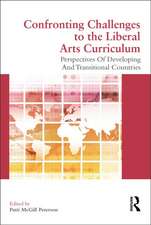Internationalizing the Curriculum in Organizational Psychology
Editat de Richard L. Griffith, Lori Foster Thompson, Brigitte K. Armonen Limba Engleză Paperback – 23 aug 2016
| Toate formatele și edițiile | Preț | Express |
|---|---|---|
| Paperback (1) | 566.76 lei 38-44 zile | |
| Springer – 23 aug 2016 | 566.76 lei 38-44 zile | |
| Hardback (1) | 577.73 lei 38-44 zile | |
| Springer – 26 noi 2013 | 577.73 lei 38-44 zile |
Preț: 566.76 lei
Preț vechi: 708.45 lei
-20% Nou
Puncte Express: 850
Preț estimativ în valută:
108.48€ • 117.88$ • 91.19£
108.48€ • 117.88$ • 91.19£
Carte tipărită la comandă
Livrare economică 17-23 aprilie
Preluare comenzi: 021 569.72.76
Specificații
ISBN-13: 9781493942824
ISBN-10: 1493942824
Pagini: 368
Ilustrații: XXX, 338 p.
Dimensiuni: 155 x 235 x 20 mm
Greutate: 0.52 kg
Ediția:Softcover reprint of the original 1st ed. 2014
Editura: Springer
Colecția Springer
Locul publicării:New York, NY, United States
ISBN-10: 1493942824
Pagini: 368
Ilustrații: XXX, 338 p.
Dimensiuni: 155 x 235 x 20 mm
Greutate: 0.52 kg
Ediția:Softcover reprint of the original 1st ed. 2014
Editura: Springer
Colecția Springer
Locul publicării:New York, NY, United States
Cuprins
Expect Surprises: I-O and the Global Business Environment.- Challenges and opportunities to developing South-North program partnerships.- The Science of a Global Organizational Psychology: Differing Approaches and Assumptions.- Educational Approaches Across Cultures: Consequences for International IO Programs.- An Integrated International Learning Model for Internationalizing I/O Psychology Programs.- Teaching and Learning Work, Organization and Personnel Psychology Internationally: The Erasmus Mundus Program.- Preparing Global Managers and Consultants: A Justification and Framework for International Exchange Programs in Higher Education.- I/O Cross-Cultural Competencies: Enhancing Creativity and Innovation in Organizations.- Developing Successful Global Contracts.- Training and Retraining I-O Psychology Faculty for Internationalization.- The Making of Generation G: Education and Collaborative Teaching to Create the Next Generation of International Work and Organizational Psychologists.- International Collaboration Experience (ICE): Using Multi-Country Student Projects to Enhance Learning and Faculty Research.- Challenges of Conducting Global Research.- Doing Research in International Organizations.
Notă biografică
Richard Griffith, Ph.D.
Dr. Griffith is a Professor in the Industrial Organizational Psychology program and the Director of The Institute for Cross Cultural Management at the Florida Institute of Technology. He received his doctoral degree in I/O Psychology from The University of Akron in 1997. He is the author of over 75 publications and presentations in the area of personnel selection and is the editor and author of several books, chapters, and journals on the topic. He has conducted funded research for the Department of Defense examining the measurement and training of cross-cultural competence and the development of region specific cultural databases. Dr. Griffith provides coaching in global leadership and executive presentations, specializing in presentations conducted abroad. He is currently the Associate Editor of the European Journal of Psychological Assessment and the co-editor of the books "The Age of Internationalization" and "Leading Global Teams: Translating the Multidisciplinary Science to Practice". His work has been featured in Time magazine and The Wall Street Journal.
Lori Foster Thompson, Ph.D.
Dr. Lori Foster Thompson is an Associate Professor of Psychology at North Carolina State University. Her area of specialization lies at the intersection of Industrial-Organizational (I-O) psychology and technology, with a notable proportion of her work dealing with global issues, such as the application of technology and I-O to humanitarian work within and outside of developing countries. She currently leads a task force on Humanitarian Work Psychology for the International Association of Applied Psychology, Division 1. She is also a member of the Society for I-O Psychology’s (SIOP’s) Executive Board where she oversees three committees, including International Affairs. Lori has taught graduate I-O courses domestically and abroad and has traveled to various countries including Myanmar, Thailand, Vietnam,Singapore, Hong Kong, Japan, New Zealand, Australia, Spain, Italy, France, England, Ireland, Sweden, Norway, and Mexico. She is founder and editor of the “Spotlight on Global I-O” column for SIOP’s quarterly publication, TIP.
Brigitte Armon, Ph. D. candidate
Brigitte Armon is a Ph. D. candidate in the International I/O Psychology program at the Florida Institute of Technology where she also works as the Assistance Coordinator in the International Student Services Office. She is a research scientist with the Institute for Cross-Cultural Management (ICCM), where she conducted funded research on the development of regional cultural databases. Brigitte is the author of several articles and chapters discussing the internationalization of the organizational psychology curriculum. Ms. Armon graduated summa cum laude from the University of Pittsburgh with B.S. in Psychology in 2007.
Dr. Griffith is a Professor in the Industrial Organizational Psychology program and the Director of The Institute for Cross Cultural Management at the Florida Institute of Technology. He received his doctoral degree in I/O Psychology from The University of Akron in 1997. He is the author of over 75 publications and presentations in the area of personnel selection and is the editor and author of several books, chapters, and journals on the topic. He has conducted funded research for the Department of Defense examining the measurement and training of cross-cultural competence and the development of region specific cultural databases. Dr. Griffith provides coaching in global leadership and executive presentations, specializing in presentations conducted abroad. He is currently the Associate Editor of the European Journal of Psychological Assessment and the co-editor of the books "The Age of Internationalization" and "Leading Global Teams: Translating the Multidisciplinary Science to Practice". His work has been featured in Time magazine and The Wall Street Journal.
Lori Foster Thompson, Ph.D.
Dr. Lori Foster Thompson is an Associate Professor of Psychology at North Carolina State University. Her area of specialization lies at the intersection of Industrial-Organizational (I-O) psychology and technology, with a notable proportion of her work dealing with global issues, such as the application of technology and I-O to humanitarian work within and outside of developing countries. She currently leads a task force on Humanitarian Work Psychology for the International Association of Applied Psychology, Division 1. She is also a member of the Society for I-O Psychology’s (SIOP’s) Executive Board where she oversees three committees, including International Affairs. Lori has taught graduate I-O courses domestically and abroad and has traveled to various countries including Myanmar, Thailand, Vietnam,Singapore, Hong Kong, Japan, New Zealand, Australia, Spain, Italy, France, England, Ireland, Sweden, Norway, and Mexico. She is founder and editor of the “Spotlight on Global I-O” column for SIOP’s quarterly publication, TIP.
Brigitte Armon, Ph. D. candidate
Brigitte Armon is a Ph. D. candidate in the International I/O Psychology program at the Florida Institute of Technology where she also works as the Assistance Coordinator in the International Student Services Office. She is a research scientist with the Institute for Cross-Cultural Management (ICCM), where she conducted funded research on the development of regional cultural databases. Brigitte is the author of several articles and chapters discussing the internationalization of the organizational psychology curriculum. Ms. Armon graduated summa cum laude from the University of Pittsburgh with B.S. in Psychology in 2007.
Textul de pe ultima copertă
Since the days of silk roads and spice routes, international commerce has been essential to business. Today, from air travel to the Internet, advances in technology have served to make the business world smaller. Yet, despite the real world's march towards globalization, organizational psychology as an academic discipline has yet to incorporate these developments into its degree programs.
Internationalizing the Curriculum in Organizational Psychology counters this resistance with a flexible floor plan to bring practical cross-cultural content into education and training. An expert international panel offers guidance on key aspects of curriculum design, including subject matter, learning objectives, competencies, and experiential learning, with here-and-now global insights and business as well as pedagogical savvy. The approach is far from monolithic, as these diverse contributors challenge readers to embrace complexity, surprise, and the inevitable humorous moments that come with cultural exchanges. Among the areas featured:
Internationalizing the Curriculum in Organizational Psychology counters this resistance with a flexible floor plan to bring practical cross-cultural content into education and training. An expert international panel offers guidance on key aspects of curriculum design, including subject matter, learning objectives, competencies, and experiential learning, with here-and-now global insights and business as well as pedagogical savvy. The approach is far from monolithic, as these diverse contributors challenge readers to embrace complexity, surprise, and the inevitable humorous moments that come with cultural exchanges. Among the areas featured:
- Meaningfully applying cultural knowledge.
- The dominance of Western perspectives and assumptions.
- Core competencies for the cross-cultural curriculum.
- Tools for implementing internationalism in course content.
- Educational models from abroad.
- Internationalizing faculty development.
Caracteristici
Addresses the needs of a globalizing organizational environment Provides insights for creating consistent standards Identifies critical curriculum elements International experts Barbara Kozusznik, Wenhua Yan, and Jose Maria Peiro present their research Describes model programs Explores faculty training issues Includes supplementary material: sn.pub/extras
















